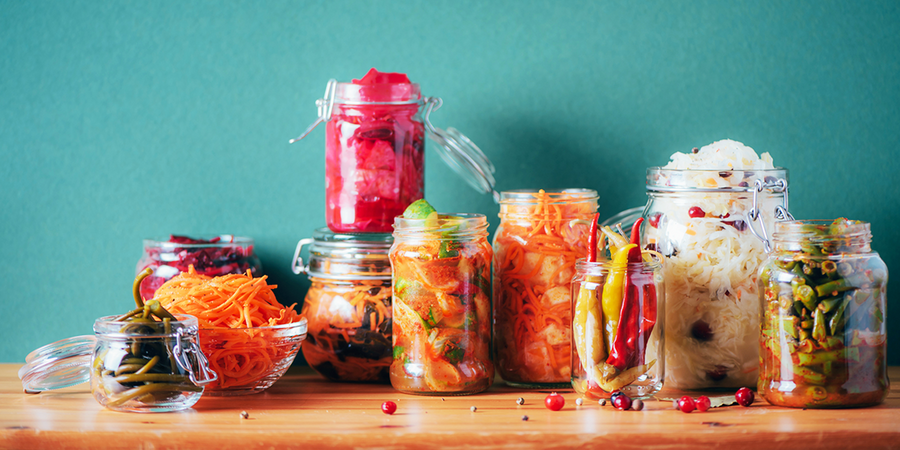
Probiotics: How They Work and When to Take Them
By Stepfanie Romine
Probiotics are in the Greek yogurt you had for breakfast and the kimchi in the Buddha bowl you ordered for lunch. They're found in the kombucha you sipped on this afternoon, and they're in the miso paste that will go into tonight's dinner. But broken down, what exactly are probiotics? Do you really need them — and what's the best way to get them?
.
What Are Probiotics?
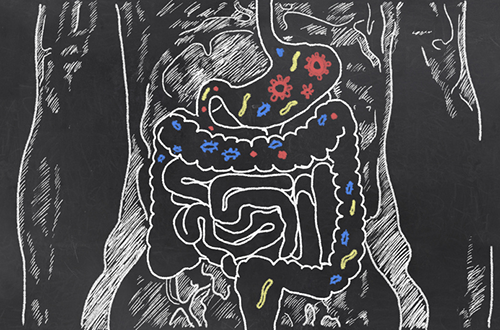
“Probiotics are good-for-you bacteria that benefit your health," explains Amy Gorin, MS, RDN, owner of Amy Gorin Nutrition in New York. That's a broad definition from which things get much narrower depending on the variety of probiotic. Specific strains are believed to benefit many aspects of overall health, ranging from helping digestive health to immune health and more.
These living microorganisms offer “a multitude of functions and benefits," adds Ethan Dixon, MPH, RD, LD, a clinical dietitian based in Texas. “Probiotics are metabolized in the gut and are found in fermented foods and yogurts, or taken as a supplement,"
.
What Are Probiotics Good For?
“Probiotics are believed to help create a healthy gut bacteria profile in our bodies, known as our microbiota," Dixon says. Microbes of all kinds have enormous effects on various organ systems and their respective functions. These gut bacteria can aid in digestion and metabolism.
That's just what's known at present. As Dixon adds, "Science continues to discover new and exciting possible benefits of probiotics."
.
Benefits of Probiotics
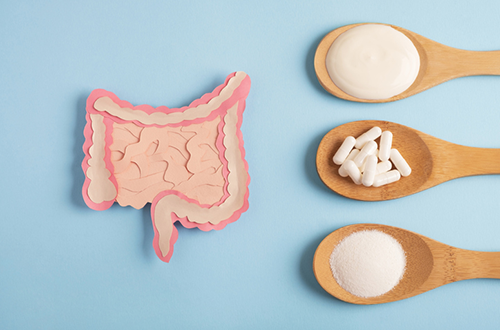
Probiotics support your health in a number of ways, which can differ based on the specific strain. Here's a look at three prospective benefits of probiotics, according to research.
1. Promote digestive health
“Scientific evidence suggests the efficacy of probiotics in some digestive issues," explains Dixon. A 2017 review in the journal American Family Physician found certain probiotics effective in a number of cases of gastrointestinal distress, and are used by 20 percent of the population to help support gut health.
2. Support immune health
A link between probiotic strains and immune health has been seen in emerging science. According to 2011 research, these probiotics may help by competing with and blocking “bad" bacteria, a phenomenon referred to as “colonization resistance" or the “barrier effect."*
3. May help improve mood
“The association between our gut microbiota and emotional health is quite fascinating," says Dixon. New emerging research (like this recent review) suggests that consuming certain probiotics may impact cognitive function, stress management, and decision-making. However, more research is needed to better understand this connection.*
.
What Are the Side Effects of Probiotics?
The American Family Physician study notes that a lack of clear guidelines on when to use probiotics and the most effective probiotic for different gastrointestinal issues may be confusing for family physicians and their patients. And this misuse of probiotics may lead to negative side effects, such as gas and bloating, feelings of indigestion, nausea, or diarrhea.
“Whether or not an individual experiences symptoms varies," says Dixon. "But many people see improvements after their body properly adjusts to taking probiotics."
.
Probiotics vs. Prebiotics
Sometimes probiotics are confused with prebiotics. “Prebiotics are a type of carbohydrate (not living bacteria) and can be thought of as the food or fuel for probiotics," says Dixon. “Prebiotics should be taken with a probiotic regimen and not alone."
Prebiotics are found in foods such as tomatoes, artichokes, bananas, asparagus, berries, garlic, onions, chicory, legumes, oats, flax, barley, and wheat, and you might see inulin added to foods that boast a high prebiotic content.
.
Should You Take Probiotic Supplements?
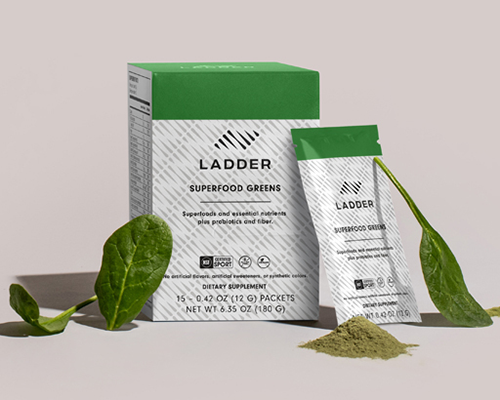
As for whether fermented foods or supplements are a better choice for getting probiotics, Gorin says both are beneficial, but “eating food first is often the way to go."
That can be hard to do consistently, which is why many people turn to supplementation to help support their probiotic intake.
.
What to Look for in a Probiotic Supplement
If you do go the probiotic supplement route, know that they're not all the same, explains Gorin. “Make sure to choose a probiotic that contains the genus, the species, and the strain," she explains. “This likely means that there is research behind the specific probiotics contained in the supplement."
The most common types of microbes used in probiotic products are Lactobacillus, Bifidobacterium, Saccharomyces, Enterococcus, Escherichia, and Bacillus.
Hardiness is also a factor to consider when choosing a probiotic supplement, which must survive not only the rigors of the digestive environment but also weeks and possibly months of storage.
.
Probiotic Foods
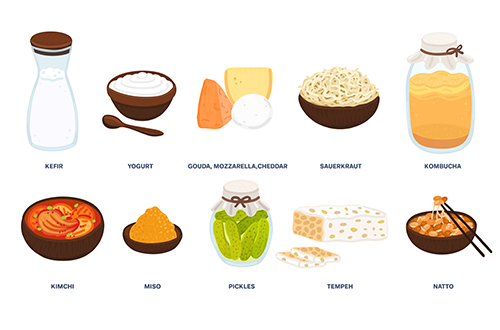
Many of the foods you eat every day contain probiotics naturally. When it comes to working probiotic foods into her diet, Gorin is a fan of probiotic-containing dairy — but only certain types contain active cultures. “Not all yogurt contains probiotics, so it's important to read the label and visit the company's website to look for transparency about this," she says.
Dixon loves kimchi and miso ramen on occasion, but as a daily probiotic source, he recommends low-sugar yogurt or kefir. “These foods also provide protein and calcium," he says.
And heads-up, kombucha fans. The effervescent drink gets Dixon's dietitian seal of approval. “It has a greatly varied culture of bacteria that is believed to resemble our microbiota," he says.
Foods that may contain probiotics include:
- Aged cheeses
- Kefir (dairy and non-dairy varieties)
- Yogurt (dairy and non-dairy varieties)
- Cultured buttermilk, cottage cheese, and sour cream
- Fresh pickles
- Kimchi
- Kombucha
- Water kefir and other “probiotic" beverages
- Miso paste
- Sauerkraut
- Tempeh
- Raw vinegar, including apple cider vinegar
*These statements have not been evaluated by the Food and Drug Administration. This product is not intended to diagnose, treat, cure, or prevent any disease.



